American Politics in Flux: A Socialist Analysis
The issue of income inequality has moved to center stage in U.S. politics. April 15, 2015 was the largest day of action in a burgeoning movement for a $15 an hour, which has caught the imagination of the broader public. Black Lives Matters protests have also continued to develop with the recent indictment of police officers in Baltimore over the killing of Freddie Gray. At the same time there is also a movement developing over the environment. There are other signs of a broad progressive shift in social attitudes including the sea-change in public opinion on marriage equality. In this increasing wave of social struggle we can see the outlines of new emerging movement of the left in the US. The promise of Occupy Wall Street is now developing deeper roots in U.S. society.
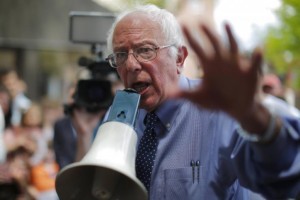
(Photo: Reuters / Brian Snyder)
With Sen. Bernie Sanders calling for a political revolution in the U.S., a candidate has emerged in the primaries who is strongly voicing the issue of income inequality and the need to fight against the elite. In less than two weeks, 185,000 people signed up to support his campaign, raising $3 million, with an average donation of $43. His rallies are attracting more people than any other candidate from the Democratic Party or Republican Party. This early support demonstrates that Sanders can bring the issue of income inequality to a broad public during the primary period. Millions of workers and young people will be hoping that Sanders’s campaign can help build a new political movement of the 99% in the U.S.
We agree with Sen. Sanders that we need a “political revolution” against the billionaires. But for it to be successful it will need to be a genuine movement of the 99%, with millions of ordinary people becoming politically active to build that movement. This is precisely what Bernie Sanders calls for – “a movement of millions.” Yet Sanders has chosen the vehicle of the Democratic Party for his election campaign. We have a major disagreement with this decision. Even if we just look at the past six years of the Obama presidency we can see how the Democratic Party is not an effective tool for bringing about decisive change. While Sanders can use his campaign to reach out to millions in the next year, any real political revolution with momentum needs to have its roots in a movement independent of the Democrat Party. Only then will decision-making be in the hands of the activists and be completely separate from the influences of big business and the 1%. Socialist Alternative urges Sanders and his supporters to avoid the trap of lining up behind the eventual corporate candidate of the Democratic Party as he has said he will. We believe Sanders should keep running as an independent all the way to November 2016.
The Primaries
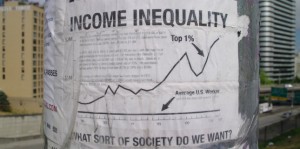
The public perception of a political system rigged in the interests of the 1% (really 0.01%) is correct. Looking at the emerging presidential race, it would appear that there is a huge divide between the two parties. And certainly on many important social issues like immigration, women’s reproductive rights, gay marriage, directed attacks on the poor and climate change there are important differences. Yet, at the same time, once elected into office, we see a relative agreement between the parties on many key issues facing U.S. society. Because, at their core, both political parties are funded and dominated by big business. Both parties’ policies have are responsible for the massive rise of income inequality, the wars in the Middle East, continued support for fossil fuel extraction, budget cuts to essential social programs and mass deportation of immigrants.
The central contradiction of our time is that capitalism is in decline, which means the system’s ability to make concessions has been significantly narrowed. Corporate profitability has been maintained by massively increasing exploitation while in the public sector there is endless austerity. Both major parties lie to the public to get elected, and then do the dirty work of big business once in office. Behind both parties and the mass media lies an elite 0.01% whose massive wealth rests in ownership of shares in big companies, financial institutions and real estate and other assets. They plough money into the two parties to represent their interests. They flood the corridors of Washington with their paid representatives to make sure pro-big business policies are enacted. These corporate-serving politicians from both parties then have to come back to the public with a new story as to why we should put faith in them again.
As the cracks grow between corporate politics and the needs of the 99%, so the cracks grow in the political system, and so the opportunities grow to build a new political party of the working class and the poor. The radicalization of sections of society offers a great opportunity to do this in the coming years. But we need to be clear on the how these two parties operate to break out of the fog they create and move forward boldly to build the new party that we need which can politically challenge the system that is the root cause of the problems we face.
Already public opinion is ripe for such a change. Opinion polls repeatedly show 50-60% support for the creation of a new party. Leaders of both parties are attempting to prevent large section of society from bolting and forming their own party. This will be a central trend in the upcoming primary season – to keep voters inside the two party system.
The Republican Party
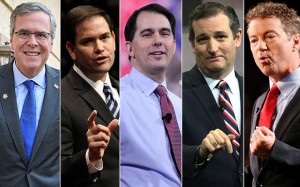
The Republican Party primary is already underway as each right-wing candidate makes outrageous statements in an attempt to win support from the right-wing base of the party. A central contradiction divides the party. On the one hand it is a big business party. While resting on a layer of more socially conservative white workers, in order to win elections its leaders have attracted Christian fundamentalists, right-wing ideologues and Tea Partiers into its ranks. While this volatile brew may have strengthened their social base and helped them win elections, it has caused massive tension within the party.
The recent shift to the left by the general public on a number of issues creates major complications for the Republicans. This is especially true on many “social issues,” where opposition had been central for mobilizing the right–wing base to help Republicans win elections in the recent past, but which have become toxic for other large sections of society. The emergence of a solid majority in favor of marriage equality is the clearest example. But on other issues like racial equality, economic inequality, decriminalization of marijuana and climate change, the public, especially young people, have moved to the left. In fact a recent poll showing 63% of the public support a $15 minimum wage is not only causing problems for the right-wing Republican Party, but also for the pro-big business Democratic Party leadership.
Faced with the alienation of their party from a growing section of the public, the big business leadership of the Republicans Party has moved to break the influence of the right-wing on Republican candidates. Their success in defeating right-wing candidates in key primaries in 2014 was a major reason for them winning a majority in the Senate.
However, in the 2016 presidential primaries the majority of the candidates are once again out in force attempting to prove their right-wing credentials to the base of the party. This Republican primary race has two threads to it. Firstly, right-wing candidates need to win over a majority of the Republican base to get enough votes in the early primaries to present themselves as viable. Secondly, if they succeed, they then need to demonstrate to the Republican big guns that their message can also win over the broader public. Not a simple task given the gulf between the right-wing position of Republicans and the majority of the public!
Charles Koch of the Koch brothers plans to spend $300 million on supporting candidates in these upcoming elections, an amount that would rival the almost $400 million spent by the Republican National Committee in the 2012 election cycle, states: “Only if somebody really stands out from the standpoint of their message and what they would actually do to benefit America and has a decent chance of being elected, only then would we select one over the others.”
In both major parties, the Iowa and New Hampshire primaries are about candidates honing their message to win over the base of the party. But in the weeks after that, primaries arrive fast and furious in up to a dozen major states. This is where powerful financial backers and the corporate media come into play. All the key levers are in the hands of big business and the leaders of the party. They will look to see if a new viable right wing candidate has emerged from the primaries who they can trust and support. Otherwise, they will put their massive wealth and corporate media power behind a mainstream candidate they can trust.
At present the two strongest potential insiders are Jeb Bush and Marco Rubio. They are both trying to stress policies that can make the party appear more reasonable with the broader public. While Jeb Bush is the strongest insider candidate, party leaders are not sure the public wants another Bush president. Rubio will need to prove that he can both weather the primary storm and show he has enough support among the elite to be an alternative to Jeb Bush.
The wild card is clearly Scott Walker. Threatening to take his union-bashing and budget-cutting exploits in Wisconsin onto the national stage, he is a potentially strong alternative to Jeb Bush. The most audacious and aggressive sections of the ruling elite have often used the Republican Party to push the envelope of how fast and publicly they speed up their attacks on the working class, especially the section organized into unions. They understand that by publicly attacking and weakening the organized sections of the working class they can then open up an attack on the rest of the working class. Especially considering the close ties between Walker and the Koch brothers, who have their own right-wing agenda, it cannot be ruled that they will end up heavily backing Scott Walker while some other Republican elites go behind Jeb Bush.
Possible Right Wing Split?
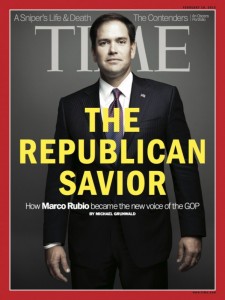 The right-wing of the party is in turmoil at present as a result of the public shift on marriage equality. Right-wing candidates are not shying away from attacks on immigrants, while others like Rubio and Bush see the need to win over Latino voters if the party is to win national elections. The right wing candidates are also doubling down on their attacks on abortion rights, especially a state level. They are also desperately trying to hold the line against growing awareness on climate change. In particular, they are working hard to protect the profits of one of their main funders – the oil, coal and gas industries.
The right-wing of the party is in turmoil at present as a result of the public shift on marriage equality. Right-wing candidates are not shying away from attacks on immigrants, while others like Rubio and Bush see the need to win over Latino voters if the party is to win national elections. The right wing candidates are also doubling down on their attacks on abortion rights, especially a state level. They are also desperately trying to hold the line against growing awareness on climate change. In particular, they are working hard to protect the profits of one of their main funders – the oil, coal and gas industries.
Inherent in this split in the Republican Party is the emergence at some point in time of a new right-wing populist party. If sections of the right wing see no potential to further influence the Republican Party with their ideas, then they could break away and form their own party. Rand Paul’s isolationist policy on foreign policy, his clear libertarian politics and his sharp anti-elitists message, while more measured than his father, are outside the kind of right-wing rhetoric on social issues that are acceptable to the Republican Party. It is around such a candidate and such policies that one could see a split of the libertarian right-wing from the Republicans develop. This would unleash a dangerous new trend in US society, as a combatant right-wing would no longer be held in check by the need to the need to trim some their excesses in order to remain part of the Republican Party. The leadership of the Republican Party will be trying to prevent the right wing from spoiling their electoral chances while also keeping them in the fold at election time.
The Democratic Party
The Democrat Party leadership is also struggling to contain growing anger among its base at the effects of the deepening crisis of capitalism and anger at Obama’s abandonment of his promises of 2008. With the corporate wing of the party having cemented its control in 1992 around Bill Clinton, they are now struggling to offer a message attractive to voters. They are facing rising anger at Obama’s policies of corporate bailouts, pandering to Wall Street, continued Middle East wars, and failure to address growing inequality. On the environment, Obama has talked a good game the past couple of years, but in practice his administration has encouraged a ramping up of fracking and recently approved oil drilling in the Arctic!
The conflict between the corporate-dominated leadership of the Democratic Party and large sections of the base of the party has heated up in recent years. The central issue is: who does the party serve? Can a political party dominated and financed by big business and loyal to their interests, also serve the interest of working people and the poor? Can a party where corporate lobbyists dominate its decision-making also represent those fighting against these interests?
Even the corporate-dominated leadership of the Democrats understands that the party has to offer some reasons for working people to remain loyal. But at a time of deep capitalist crisis, when offering working people major economic reforms means taking something back from corporate America, how can that work? Obama’s time in office demonstrates that despite his pre-election promises, when in power, he delivered for Wall Street and big business right down the line. How can the party offer something different in 2016?
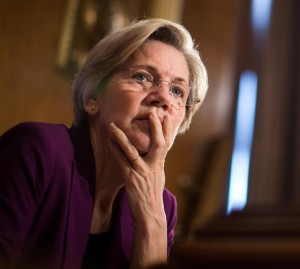
Elizabeth Warren is the best known spokesperson for a different policy for the party. She has railed against corporate interests that dominate the party and against policies that have abandoned the 99%. We support her attacks on the big banks and her message of how politics has been taken over by the corporate interests. It is interesting that Obama felt the need to attack her in his efforts to push through TPP. While we support many of her calls for reforms on housing, student loans and the banking system, etc, we would say her program is insufficient to address the real urgent needs of working people.
And by refusing to enter the presidential race, she abandoned any opportunity to mount a strong challenge to the corporate policies of the leadership of the party. We should be under no illusion that the leadership would have looked kindly on her actually winning the primary if she were to run. Her rhetorical attacks on big banks whose interest the party defends, are unacceptable to the leadership. The leadership would have attacked her ruthlessly if she had run and threatened to actually win the nomination.
There is a long history of the Democratic Party courting candidates who give voice to the demands of social movements. But they expect the candidates to play within the rules of the game. This means not seriously attacking the corporate core of the party, and once the nomination battle is over, to deliver their supporters to the eventual nominee. They want the candidate to provide better window dressing, but they will trash any candidate who threatens the interests of their corporate sponsors.
The best recent example is the way the party leadership destroyed the anti-war candidacy of Howard Dean during the 2004 primary. Based on energetic online fundraising Howard Dean was capturing the anti-war mood and was outpolling other candidates at the end of 2003. In a massive media barrage, sections of a speech where he shouted to be heard above the crowd, labeled ‘the scream,’ were isolated from their context. Played over 700 times in the corporate media, his campaign was crushed. For example, a major article in the liberal Los Angeles Times used language like “emotional meltdown” and “border-line psychotic” to describe Dean (January 22, 2014.) Then, to encourage his angry supporters to remain loyal to the subsequent pro-war candidate Kerry, Dean was given a powerful administrative post in the party.
The Anointment of Clinton?

The leadership of the party have their preferred candidate – Hillary Clinton. While electing Hillary Clinton as the first female president will be seen by millions as a significant step forward for women, it is essential to judge her on her politics. The best way to describe Hillary Clinton’s policies is that they represent a continuation of the policies of the Obama Administration.
Hillary Clinton’s politics can be defined by her record. As Secretary of State in the Obama Administration she pushed hawkish policies, including supporting the 2009 troop surge in Afghanistan and US intervention in Libya. She was also a vocal proponent of drone attacks that have led to an estimated 2,000 civilian deaths. As Secretary of State, Clinton was active in promoting fracking worldwide through the Global Shale Gas Initiative. She has also refused to comment publicly on the issue of the Keystone XL pipeline. She is no friend of those who are looking for a shift away from Obama’s policies on civil liberties. In the Senate she voted for the re-authorization of the Patriot Act. Thus it is no surprise that Wall Street giants JP Morgan, Goldman Sachs, Morgan Stanley and Citigroup are among her top political donors.
When judging Clinton’s election run, we need only remember the promises made by candidate Obama, and the massive enthusiasm that greeted his election. Yet six years later Obama and the Democratic Party leadership have made passing the Trans Pacific Partnership their central legislative goal for 2015,This, despite the massive opposition of the base of the Democratic Party. Interestingly, considering her active support for previous trade agreements, including NAFTA, Hillary Clinton has refused to say anything about TPP since she does not want to alienate her base during the present battle in the party.
Obama has consistently tried to demobilize people from being active in struggles, for example in Black Lives Matter or in opposition to the Keystone pipeline. Instead, we need to remember the coordinated action by the Obama administration to shut down Occupy Wall Street encampments, the mass deportations of immigrants, rampant drone bombings, promoting fracking, and opening up Arctic waters to oil drilling. Do we really expect anything different from Hillary?
In 2016, workers and young people may be faced with a choice between Clinton and Scott Walker. In this scenario, many progressive voters will feel forced to vote for a lesser-evil candidate who they feel can stop the Republican agenda from capturing the White House. However, it is a mirage to think that voting Democratic can prevent the continued roll-out of the agenda of corporate America. It is not Do that can decisively defeat the right.
Was it the Democratic Party that forced a public breakthrough on marriage equality, income inequality, and the demand to cleanse racism from police forces? Clearly no, as even Obama did not come out in support of gay marriage until a majority of the country supported it. The Democratic Party and its politicians in general are not leaders on social issues, instead they follow public opinion. Also, it was not the Democratic Party who led the way fighting police repression of social movements, high-stake testing in schools, fracking and tar sands energy extraction, the growing restrictions on access to abortion, or demanding full right for all immigrants. It is the building of powerful movements in the streets and powerful independent electoral challenges that produces shifts in politics. It should be remembered that the Republican Nixon presidency was more ‘progressive’ than any Democratic Party administration since then – exactly because of the powerful movements in the streets that were driving the national agenda.
Instead of fighting the agenda of the Congressional Republicans, Democrats have time and again compromised with them. But each compromise cedes political ground to the Republicans, who then come back demanding more. This has resulted in the Obama administration implementing formerly Republican policies like massive deportation of immigrants and privatization of schools. Further rounds of accommodations by Democrats have meant that the shift to the right in the policies of both major parties, dating back to the 80s has remained essentially unchanged up until now. However, the movements of low paid workers and black youth is forcing at least a rhetorical shift by some elements of the establishment.
While we understand the yearning of many progressives to elect a first female president, her record and corporate funding indicate she would in fact be a continuation of pro-Wall Street politics which would hurt the majority of women. Electing Democrats as a ‘lesser evil’ to Republicans may slow slightly the attacks of the corporate and right-wing agenda, but it will then be followed by disappointment with Democrats, and the re-election of Republicans. Electing a Democrat in 2016 will mean a further continuation of policies of the last few decades whereby capitalism has worsened the lives of working people while enriching the elite 1%. Working for a Clinton victory simply delays once again the important and necessary work of laying the foundations for a genuine political fighting voice of the 99% that can emerge as an effective weapon to defeat the corporate agenda.
Packaging the Candidate

The problem for the Democratic Party leadership is selling Hillary Clinton to a public wary of entrenched interests in Washington. This resulted in the choreographed rollout of her candidacy, using a motor tour and images of her speaking to ordinary people in cafes. Her comment: “There’s something wrong, when hedge fund managers pay lower taxes than nurses or the truckers I saw on I-80 when I was driving here over the last two days” was given wide media coverage. However, these comments do not unsettle her Wall Street backers.
An article in politico.com stated: “But back in Manhattan, the hedge fund managers who’ve long been part of her political and fundraising networks aren’t sweating the putdown and aren’t worrying about their take-home pay just yet. ‘It’s just politics,’ said one major Democratic donor on Wall Street, explaining that some of Clinton’s Wall Street supporters doubt she would push hard for closing the carried-interest loophole as president, a policy she promoted when she last ran in 2008.”
The bigger question for the Democratic Party is: can Clinton, a member of the establishment with a track record of serving Wall Street and a hawk on foreign affairs, really excite young people and the base of the party? The prospect of a Bush v Clinton rerun would hardly offer an alternative to corporate politics as usual!
Certainly, the Democratic Party can introduce some shifts in policies, for example on the minimum wage, increased spending on green energy and renewing infrastructure, rolling back aspects of militarization of the police, etc. These are all issues that some sections of the ruling elite support.
Also, with 63% supporting a $15 an hour minimum wage, there is discussion in the party on how to get these voters to support the party without also alienating some of its core business support. At present, sections of the leadership are lining up behind a phased-in national $12 an hour minimum wage by 2020. New York Democratic Party Senator Schumer explains the purpose for this proposal: “The politics, substance and morality coincide to make it a winner issue for us in 2016,” Democratic Party leaders see it as a key electoral demand to mobilize voters while not alienating the business lobby it serves and put Republicans on the defensive.
Sizeable sections of the Democratic establishment have been concerned that the Democratic primary will be seen as simply as a coronation of Clinton. They wanted to see Clinton challenged in debates by a reliable, slightly left candidate to prove her battle-readiness and her ability to connect with voters on the key issues. Instead of that, they now have Bernie Sanders to contend with.
The Democratic Party leadership will be concerned that the unacceptable Sanders can make real gains in the primary process. We can expect the Democratic Party leadership to push forward other progressive candidates into the race to blunt the effect of Sanders and prevent debates centered on exchanges between Clinton and Sanders. Already former Governor Martin O’Malley has announced he’s running. There is a long history of new candidates emerging in the Democratic Party primaries to win over left- wing-activists.
Building Social Movements
The success of the dynamic mobilization around $15 an hour to affect politics is there for all to see. Only recently in 2013, Obama was talking about $10.10 an hour minimum wage. As on marriage equality, the Democrats are producing a weak and delayed response to dynamic social movements and profound shifts in the mood of the public. This demonstrates once again the key necessity for social movements to keep raising the heat on politicians by mobilizing around bold demands.
We believe that the central task in politics today is to build powerful social struggles to activate working people and lay the groundwork for new political force to challenge capitalism. A cohesive social and workers movement needs to link up the struggles against low wages, police brutality, in defense of the environment, and in defense of women rights. An integral part of this has to be to challenge big business and the right wing in the political arena.
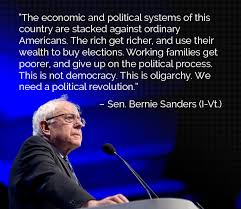 The entry of Bernie Sanders into the presidential race will sharpen the debate and draw into the discussion a much broader section of the 99% who are looking for the kind of policies Sanders is offering. Sanders can play a good role in challenging the pro-corporate agenda of Clinton. It can sharpen the debate and can seriously embarrass Clinton as she attempt to sleepwalk voters into her nomination.
The entry of Bernie Sanders into the presidential race will sharpen the debate and draw into the discussion a much broader section of the 99% who are looking for the kind of policies Sanders is offering. Sanders can play a good role in challenging the pro-corporate agenda of Clinton. It can sharpen the debate and can seriously embarrass Clinton as she attempt to sleepwalk voters into her nomination.
Socialist Alternative sees an urgent necessity to challenge corporate politics in every possible arena. The entry of a well-known candidate like Bernie Sanders can broaden the political dialogue and raise the sights of many. However, we also have important political differences with Sanders. For example, we have opposed his failure to criticize Israel’s attacks on Gaza last year. While calling himself an ‘independent’, Sanders has drawn closer to the Democratic Party in recent years. His failure to address the scale of police brutality that ignited the Black Lives Matter movement and his failure to call for serious reforms, unless corrected, will weaken his campaign.
Yet, despite our political differences with Sanders, we welcome his entry into the election. His attack on the corporate domination of politics and many of the demands like a $15 an hour minimum wage, free college tuition, a $1-trillion program to rebuild the nation’s roads and bridges, government-run universal healthcare (single payer) and higher taxes on the wealthy provide a radical political alternative direction for workers and young people. His active role in opposing the Trans Pacific Partnership can also give his electoral challenge a campaigning edge.
At the same time, running inside the Democratic Party will increase illusions that the Democrats can be a vehicle for fundamental change, despite all evidence to the contrary.. If Bernie Sanders had run as an independent, all those excited by his platform and all their energy would be directed towards building an independent campaign that could lay the basis for a breakthrough for the left. Running independently from the Democrats would have brought together workers and left activists from different movements and would be an important step towards building an alternative political party that can represent the interests of the 99%.
It is not an accident that the Democratic Party has been called the ‘graveyard of social movements.’ Time and again activists and supporters of powerful social movements have been seduced away from building struggle in the streets by promises made by more ‘radical’ candidates the Democratic primaries, only to see those candidates defeated. The end of this process is being sucked into ‘lesser evil’ arguments to support the Democratic nominee.
One well-known example was Dennis Kucinich, who had built support among anti-war activists. He strung supporters along into working within the Democratic Party until the nominating convention in mid-summer of 2004 with the promise that this would give him a prime-time platform to criticize US involvement in the Iraq war. However, under pressure from the leadership, when the time came for his speech, any mention of opposition to the war was dropped. Anti-war activists had abandoned organizing against the war only to be left with pro-war Kerry as the Democratic Party candidate.
While a Sanders candidacy can sharpen the debate, there is almost no chance of his winning the nomination. Sanders is completely unacceptable to the Democratic Party leadership. The central contradiction of Sanders using the vehicle of the Democratic Party to launch his political revolution will become clear in early 2016. At that time, unable to win the nomination he and his supporters will face a crossroads. Will Sanders direct them into supporting the eventual Democrat Party nominee, or will he use this momentum to build a necessary challenge outside the Democratic Party?
Sanders has publicly stated that if he does not win, he will not take his campaign outside the Democrats, but instead support the official party nominee, likely to be Clinton. While we understand that if his campaign really takes off he may revisit that decision, this should be seen a real warning that Sanders will bury his campaign into the Democratic Party.
We will urge Sanders and his supporters to not become sucked into the Democratic Party vortex, but instead mount an independent electoral challenge in 2016, as a step towards building a new political party of the 99% in the US. Running left anti-corporate independent candidates not only helps build social movements, but also helps reach out to the broader 99% who are looking for real answers to the many problems they face, and bring them into political activity. We believe this is the principal lesson to be drawn from the Kshama Sawant’s electoral success in Seattle. If Sanders chooses not to continue as an independent, he should endorse and throw his weight behind the strongest left independent challenge to Hillary Clinton and whoever the Republican party nominates.
A central issue facing working people today is to build a powerful political movement that can defend their interests and promote an alternative agenda that they can rally the broader 99% into struggle. This would logically lead to the creation of a new fighting and campaigning political party based on the interests of working people.
The increasing radicalization around low wages, $15 an hour, the Black Lives Matter movement, and struggles against climate change offers a historical opportunity in the next few years to bring activists in these movements together to create the foundation for such a new party. Given present circumstances, steps towards creating such a party could happen very quickly. An essential starting point is political clarity that the Democratic Party cannot offer an alternative for working people.
Because of Sanders’s stature, we would urge him not to allow his supporters to be buried in the Democratic Party, but instead to break from the Democratic Party and to build an independent campaign for president. If he does not do so, we will urge his supporters to break from him and join with others, including the Green Party, to build of the strongest possible independent alternative to corporate politics in 2016.
A more detailed explanation of our position on the Sanders campaign can be found here.


